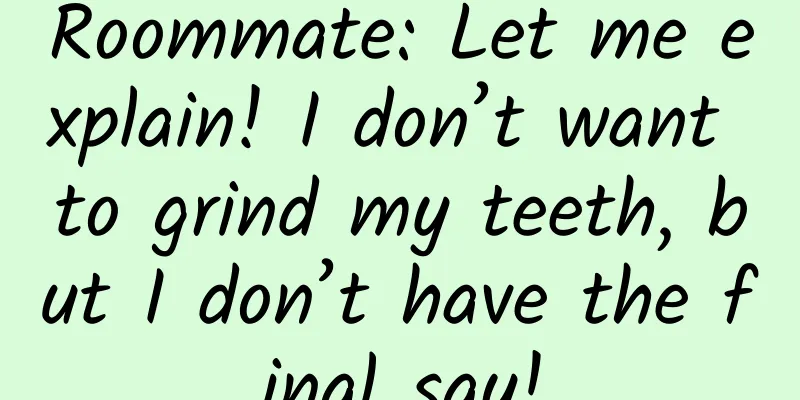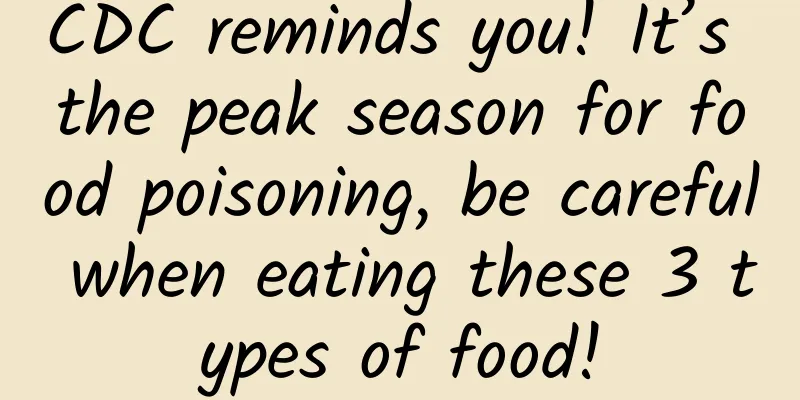Roommate: Let me explain! I don’t want to grind my teeth, but I don’t have the final say!

|
Produced by: Science Popularization China Author: Peng Zhiping (China Sleep Research Society) Producer: China Science Expo Just the day before yesterday, Professor Gao Xuemei of Peking University School of Stomatology interpreted the Chinese theme of World Sleep Day at the "World Sleep Day China Theme Release Conference and the Launch of a Large-scale Science Popularization Activity": "Good Sleep is the Source of Health". The meeting mentioned that sleep, together with diet and exercise, is the cornerstone of a healthy life, and sleep is the foundation of the latter two. Sleep is the source of health. (Photo source: Veer Gallery) Undoubtedly, sleep is very important, but when we sleep, there are many factors that affect our sleep, such as the "squeaking" sound of roommates grinding their teeth. Teeth grinding, although seemingly harmless, actually greatly affects the quality of sleep. Have you ever thought about this question - why do people grind their teeth while sleeping? Is teeth grinding a disease? Teeth grinding, medically known as bruxism, refers to the phenomenon in which a person's upper and lower teeth unconsciously grind or bite against each other in a certain rhythm while sleeping or awake. In fact, the fundamental reason why people grind their teeth while sleeping is that some cells in the cerebral cortex that control the jaw motor area are abnormally excited under "certain circumstances", which leads to dysfunction of the trigeminal nerve. The trigeminal nerve controls the human body's masticatory muscles. When the masticatory muscles enter an abnormal state of activity, teeth grinding will occur. (Photo source: Veer Gallery) The phenomenon of teeth grinding while sleeping is still quite common in our lives, but teeth grinding can bring us some adverse effects: frequent exercise of the chewing muscles may cause muscle fatigue, which over time can cause dizziness, headaches, or discomfort in the cervical spine, shoulder and neck pain, and thus affect the quality of sleep. Teeth grinding may also cause emotional irritability, which in turn causes a decline in the function of the digestive system and may lead to eating disorders. At the same time, if other people talk about your teeth grinding, you may feel increased psychological pressure and mental tension, which may cause psychological disorders over time. Some children in the tooth replacement period have the habit of grinding their teeth at night. This is an activity to establish a normal occlusal relationship and is a normal phenomenon. With the formation of a normal occlusal relationship, the night grinding will disappear without treatment. Some children also grind their teeth due to parasites or genetics. In this case, medical treatment is required. Occasional grinding of teeth by adults may be caused by psychological factors. If there is a long-term habit of grinding teeth, it may be bruxism. It is recommended to see a doctor for diagnosis. Who is the culprit for teeth grinding while sleeping? The first is the disease factor - oral diseases, gastrointestinal diseases and other diseases can cause bruxism. In addition, studies have shown that bruxism also has familial genetic factors, such as persistent childhood bruxism. (Photo source: Veer Gallery) In addition to the physiological factors just mentioned, psychological factors can also cause us to grind our teeth unconsciously when we sleep at night. If we are nervous, stressed or too excited during the day, a part of the cerebral cortex will still be excited after we fall asleep at night, which will cause the chewing muscles to contract and lead to teeth grinding. Some readers may ask: I don’t know if I grind my teeth when I sleep, what should I do? There is no specific self-test method for this problem. However, if you are reading this article and really want to know whether you grind your teeth, you can consider recording yourself while sleeping, or you can ask your roommates - don't be shy! Don’t worry too much, teeth grinding is preventable and treatable! Teeth grinding is not a serious disease, but if you really grind your teeth every day, it can be a bit "life-threatening"! So, can the problem of teeth grinding during sleep be solved or alleviated? What are some ways to solve teeth grinding? Let me tell you in detail... (Photo source: Veer Gallery) First of all, symptomatic treatment is necessary. For calcium deficiency, calcium supplements are needed. For vitamin deficiency, vitamin supplements are needed. For parasites, anthelmintics are needed. For genetic factors, the symptoms that have already been caused are treated first. For those who grind their teeth due to occlusion mentioned above, they should go to the dentistry department for examination and treatment as soon as possible. For patients with severe grinding habits, a night bruxism protection bite pad can be made according to the shape of the teeth. It can be worn on the upper teeth at night when sleeping to protect the occlusal surface of the teeth. In terms of drug treatment, common ones include botulinum toxin, which is mainly used for orthodontic maxillofacial movement disorders and dystonia, and L-dopa, which can regulate the central nervous system and significantly reduce the number of times patients with bruxism grind their teeth. If drug treatment is required, everyone must follow the doctor's advice! In addition, for bruxism caused by psychological problems, patients can seek help from psychologists to relieve psychological pressure. At the same time, please also understand that patients with bruxism do not want to disturb other people's lives, and family members should be more tolerant and provide appropriate comfort and guidance. So, how can we prevent teeth grinding? On the one hand, we should develop good living habits, eat regularly, eat nutritiously, exercise properly, and pay attention to oral hygiene. In addition, we should eat less stimulant foods, try not to smoke or drink, and do not consume beverages or foods containing caffeine before going to bed. If there is muscle tension, we can keep the teeth relaxed and reduce the activity of the bite muscles during the day, and apply hot compresses to the upper and lower jaws before going to bed to relieve the bite muscles. On the other hand, to maintain a good attitude, you can listen to some stress-relieving music before going to bed, or soak your feet before going to bed to keep your mind stable. Try to create a good sleeping environment for yourself, which can also improve sleep quality and relieve anxiety. With active prevention and treatment, bruxism is not a scary thing. Editor: Sun Chenyu |
<<: 【Smart Farmers】The story of earthworms: Great ecological engineers
>>: What?! Is there a “strong AI” that can defeat GPT4?
Recommend
Is the expanding universe really an illusion?
Traditionally, the standard model of cosmology ho...
Another national treasure! China's first space telescope - CSST is here
Not long ago, at around 22:30 on July 12, 2022, B...
NIO App now available on Xiaomi Watch App Store, watch can also unlock car
The biggest highlight of new energy vehicles comp...
Christmas is coming, how to write copy that takes advantage of the situation?
When it comes to copywriting that leverages hot t...
Is Damascus rose a rose? No! Not even a rose.
Speaking of Damascus, more people may think of th...
Usability issues and optimization of 4 UI elements in iOS
For reference, the thinking mode and even the spi...
TIOBE November Programming Language Ranking: Is iOS development really no longer popular? OC and Swift have fallen in popularity
There was a time when dynamic languages, or scrip...
How to write an event planning proposal? These elements are essential!
Do you hope that the event will become a hit? Tha...
JD.com e-commerce operation traffic logic
1. Top-level structure of traffic logic 1. Accura...
Want to upgrade to Android 5.1? Don't click update yet, just wait
If you are a Nexus device user who is constantly ...
Is the information flow optimization effect so good? Optimization skills of the information flow girl with a monthly salary of 2w+!
A few days ago, the editor was thinking about one...
There will be frequent cold air in the next ten days, and there will be sandstorms in these places!
Recently, snowfall occurred in Qinghai, Heilongji...
Southeast Asian cross-border e-commerce platform Shopee Entrepreneurship Course
Southeast Asian cross-border e-commerce platform ...
How to write World Cup copy? Here are some ready-made…
The World Cup is coming, how can copywriters scor...
What are the requirements for joining Baidu AiPurchasing? How much does Baidu Aicaigou promotion cost?
If we say that industrial manufacturing companies...

![Red Hat Certification RHCSA video tutorial Linux redhat 7.0 full set [theoretical video + experimental video + experimental document]](/upload/images/67cc02571ea8d.webp)







